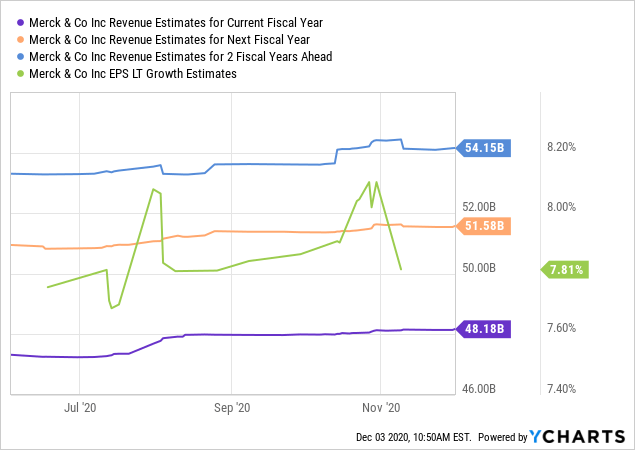Summary
- Merck owns one of the best drugs in the world, Keytruda.
- The company has a solid growth outlook going forward.
- An inexpensive valuation and a solid dividend yield round out the positive picture.
- Looking for a helping hand in the market? Members of Cash Flow Kingdom get exclusive ideas and guidance to navigate any climate. Get started today »
Article Thesis
Merck (MRK) is one of the largest pharma companies in the world, yet it is surprisingly underfollowed. The company owns one of the largest and most promising drugs in the world, Keytruda, which will generate huge sales growth in the foreseeable future. Shares are not expensive, offer a solid dividend yield, and they recently got a strong value endorsement as Berkshire Hathaway (BRK.A) (BRK.B) entered a billion-dollar position in the company.

Data by YCharts
Merck trades relatively in-line with other large-cap pharma and biotech companies, trading at an overall inexpensive valuation while offering a yield that is substantially higher than that of the broad market.
Strong Growth Outlook
In the biotech and pharma industry, growth depends on the relative attractiveness of the drug portfolio of each company to a large degree. Those companies with young portfolios that do not face a patent cliff anytime soon are generally better positioned for the future, while those that face a meaningful number of losses of exclusivity (LOEs) may have bigger problems in growing their revenues. The effectiveness of the company's drugs matters a lot as well, of course, and last but not least, those drugs that target bigger indications have higher earnings potential. One of the best drugs in the world, based on these factors, is Keytruda (pembrolizumab). This monoclonal antibody is used to treat a range of tumors, including lung cancers, melanoma, and colorectal cancers. Oncology is one of the biggest segments of the pharma industry, with forecasted revenues of $180 billion in 2025, thus being active in this space means that there is a huge addressable market. Keytruda can be used to treat a range of indications, which means that its revenue generation potential is not limited to one sub-segment of the market. The indications Keytruda can be prescribed for include lung cancers (NSCLC and SCLC), which are one of the biggest indications in the oncology space. The NSCLC market alone is easily generating more than a dozen billion dollars a year in revenue, and Keytruda can be used for the treatment of other cancers on top of that. Keytruda generated revenues of $3.7 billion during the most recent quarter or ~$15 billion annualized. When we factor in that Q3 was impacted by the pandemic, we can assume that Keytruda's sales potential is even higher than that. Some people avoided visiting their doctors, which resulted in fewer cancer screenings, and thus fewer treatment starts compared to normal times. Once the pandemic has ended, cancer screenings will likely rebound, and Keytruda and other cancer drugs could see even higher revenues. Even though recent quarters were negatively impacted by the pandemic, Keytruda still generated revenue growth of more than 20% during Q3 on a year over year basis.









